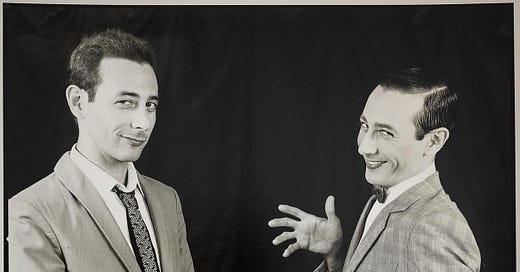How to Save a Life
When the life you save might be your own, with Human by Twin Flames
When I was getting sober my 12-step sponsor said to me, look for ways to be of service. Show up early, make coffee, stay late, help clean up. This was how I would participate in community and create a sense of belonging for myself. It also supported the familiar 12-step axiom, if you want to keep it, you need to give it away.
In those early days of sobriety I was eager to get well, so I dedicated myself to being of service. I started to recognize people, especially if they were new or struggling. And the more I showed up the more people showed up for me. After years of feeling disconnected and frightened, I began to experience a sense of belonging. Not only to the 12-step group but to life itself.
It isn't an exaggeration to say that in those rooms, a smile can save someone's life. It is a radical act in our society to recognize one another’s humanity and honor it without judgment. And together we were choosing life over death. We tried to remember this fact and celebrate it.
There was so much to mourn over, to feel grief over, to regret. Every time we gathered we would share stories of things we had done, those things for which we were most ashamed, the mistakes we believed were permanent defects of character. And we would listen silently; our sole response to each person, “keep coming back.” And then after we’d close with prayer and hugs, we’d experience what was often the most healing part of the evening: washing the dishes and sweeping the floor.
For those of us who struggle to accept ourselves—who have regrets about past mistakes, who hold secrets we have never shared for fear we will be judged and rejected—it is powerful medicine to tell the truth about yourself and then have someone willing to stand next to you and laugh while you’re both washing dishes. This is what creates a sense of belonging. To be seen and known and to have a purpose, just as you are.
It’s been nearly a week since I was at family camp at N-Sid-Sen surrounded by loving community, in service to one another and to the Holy. The sense of belonging I experienced is still resonating within me. I keep smiling at strangers expecting them to smile back. Instead I’m often met with the blank look of the disengaged. Out in the world we humans wear the armor of detachment and aloofness to protect ourselves. It is dangerous to be vulnerable among strangers.
When I began attending camp nearly ten years ago everyone was a stranger. And my defenses of detachment and aloofness were on high alert. I was genuinely afraid of singing silly camp songs, of making a fool of myself, of somehow sticking out from the group. It felt too risky to be vulnerable. Instead, I made a point to volunteer for things, to show up early and be useful as I was taught. It seemed safer to show my capabilities. And I resisted anything that might make me look silly.
But I soon realized how critical it is to look foolish, how important it is to make mistakes for all to see. Usefulness and purpose are deeply meaningful, but our failures and humanity allow us to connect. To create community and a sense of belonging we have to be willing to do both: bring our vulnerable wounded selves, showing up exactly as we are, and make the coffee and wash the dishes.
One of my favorite mantras is Our words, our hands, our feet are the words and hands and feet of the Holy. They have the power to do good in the world and to spread blessings to those around us. But they are still just our silly old words, our funny looking hands and feet. Our humanity and imperfections are part of what make our gifts holy. When we show up as our real selves, mistakes and all, and offer our humanity in service to something larger than ourselves, miracles happen. Communities of love are built. Lives are saved.
May you show up this week exactly as you are and know you are loved. And may your words and hands and feet bring blessings to all you meet. And may we all remember to show up early, sing silly songs and make mistakes, and share the truth of who we are. And may we never forget to stay late and wash the dishes.





I've struggled with my relationship to the rooms and the program but I've always been grateful to have my place there. I've found myself thinking at times, "god, I wish everyone was an addict so they could experience this level of acceptance from other adults". It's a funny thought, but there aren't many spaces in our culture for that kind of community, especially with so many of us staying out of churches due to being disillusioned about spirituality or carrying around religious trauma. Thank you for sharing!